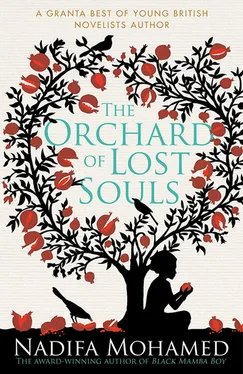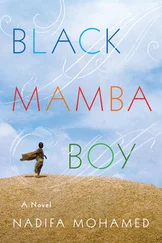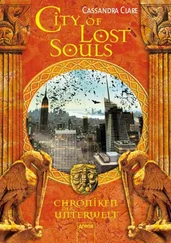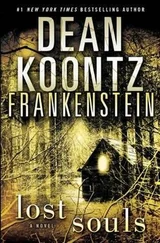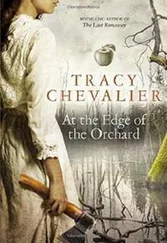Nothing grabs her attention enough to part her from the hundred shillings until she reaches a corner stall with animals. The trader, sitting on a stool with a white lamb cradled in his arms, has dark, pitted skin and oily straight hair and smiles a generous smile as she approaches. A tortoise crawls lethargically around his feet, tied by a leg to the stool, various birds squawk and flap inside cramped cages, and in the depths of the stall she can see a small brown-mottled fawn sat on its haunches. Deqo quietly kneels beside it and the fawn looks at her with terrified, wet eyes.
‘How much?’ Deqo asks the trader.
He scratches his jaw before answering, ‘Give me five hundred.’
She runs a hand over the animal’s back; it trembles with each rapid heartbeat. It should be with its mother. ‘I only have a hundred.’
‘Oh, forget it, then.’ He turns back to the street and spits.
‘What do you feed it?’
‘Cow’s milk. Why don’t you ask your mother for more money if you like it so much?’
‘I don’t have a mother.’ She scratches the fawn under its chin and its ears flick in response.
‘Or your father then. Or. .’ He drags a straw basket over to his stool and tips it so she can see inside; a flurry of yellow chicks fall over each other and chirp in alarm. ‘You can have one of those for a hundred. Pick one.’
Deqo pats the fawn on its head and then examines the chicken orphanage. She pities their fragility; it would be easy to crush one in her palm. She sticks her hand in and strokes the downy chest of one flailing on its back. The first two years of her own life had been spent in the overcrowded cots that contained the camp’s youngest orphans, where they were left to clamber over each other and poke curious fingers into unguarded eyes. Somehow she had emerged from that cage and learnt to walk and talk and feed herself.
‘I’ll take her. And when I have enough money I’ll come back for the deer,’ she says resolutely.
He mock salutes her and takes the money. ‘I’ll be waiting for you!’
Deqo walks back to the house slowly, tickling her face with the chick’s fuzz; she hopes that it will one day grow into a proud, bright-plumed hen, the matriarch of her own ever-expanding brood.
China steps over Deqo to set the kettle on the charcoal burner; she harrumphs and makes indistinct complaints aimed either at Deqo or the baby tied to her back. The boy’s face is squashed hard against China’s back; it looks uncomfortable but he doesn’t whimper. Deqo is half grateful, half envious that she has never been carried like that. The chick is on her lap, walking up and down the length of her thighs.
‘I thought you were meant to work in this house, not just sit there with that thing and eat our food?’
‘I have finished the cleaning, China. Is there anything else you would like me to do?’ she replies calmly.
‘Well, take this weight off my back for a start.’ She unwraps the boy and dumps him into Deqo’s arms.
Nuh’s arms flop to the side of his body; he smells as strongly of alcohol as his mother and seems drunk too, his eyes half closed and motionless. She looks up sourly at China. Why did you get to keep your child when you can’t even care for him? she thinks.
‘Deqo!’ Nasra exclaims. A tall man with a wooden cane stands behind her in the courtyard. ‘You’re back. Is that what you bought?’ She points to the new chick. ‘Have you named it?’
Deqo shakes her head. ‘I’m still deciding.’
‘Does that child belong to her?’ the man asks. He lifts his sunglasses up to look at her more closely, muttering something into Nasra’s ear.
‘Of course not, that is China’s son.’
The man steps further into the kitchen and bends down over Deqo; he smiles and reveals two gold canines. ‘Pretty girl,’ he says, catching her nose between his tobacco-stained fingers.
‘You’re in perfect health, aren’t you, Deqo?’ Nasra gently pulls him away from her.
Deqo nods shyly.
‘Let’s talk in my room,’ Nasra says, leading the visitor out of the kitchen.
‘Oh, you’re set for the chopping board, little one,’ chuckles China.
‘What do you mean?’
‘You’ll soon find out.’ China takes Nuh from her and walks back to her room with a flask of tea.
Deqo shoves the chick into her skirt pocket and stands beside Nasra’s door, but she cannot hear the conversation no matter how hard she presses her ear to the wall. Deqo goes back to the kitchen, telling herself to not be so suspicious; Nasra wouldn’t let anyone hurt her.
The new year brings new customers — soldiers and plenty of them; the man who jumped into the courtyard returns nearly every night and brings his comrades with him. The house of women has become the house of men, and even Stalin seems humbled. Unhindered by the curfew, they arrive at midnight and leave before dawn, but by that time the bungalow is in chaos, with displaced cups and glasses everywhere, broken plates thrown into the kitchen, cigarette butts and empty bottles littering the courtyard, washing pulled from the line and trampled, urine all over the toilet floor.
The women sleep all day, exhausted, while Deqo cleans. The old customers do not come, afraid of the soldiers, and she misses their neatness. It is hard to sleep when there is music all night and footsteps a few inches from her head, but it is their voices that really bother her: why do men speak so loudly? They shout rather than talk and laugh like the world needs to know they are laughing. She covers her ears while they boast about how the city is theirs, how they can do what they like and no one says anything, and as if to prove that, one of the young conscripts likes to run into the kitchen, pull up her skirt and then escape while the others guffaw. They declare each week that planes and artillery and bulldozers are on their way to Hargeisa, but Deqo never sees them. The chick, now named Malab after her honey-coloured new feathers, has also come under threat from a strange young soldier with a shaven head, who tries to stamp on her if she leaves the safety of the kitchen.
The presence of the soldiers has made the neighbours even more hostile than before and the front door is streaked with goat shit. Deqo begins to cover her head and a little of her face when she heads for the market after Stalin is caught by local women and beaten with brooms. They are angry that their husbands and sons have been taken away and some had come to the house earlier to plead with Nasra to find out from the soldiers where their loved ones had gone. She had refused. It was Nasra they were after, Stalin said when she staggered in, bruised and limping, but the neighbours would send a message through any of them.
After the dry season ends, Karl Marx packs a suitcase and leaves one night without bidding farewell to any of them. Nasra, China and Stalin remain behind but are subdued; they take what they want from Karl Marx’s room and continue to play act with the soldiers, laughing dryly at their jokes and dancing strangely with them in the dark courtyard.
Nasra is glassy-eyed and drinks from China’s bottles; she looks through Deqo when she tries to talk to her, her words slurred and incoherent. She has lost weight despite the money she is drawing from the soldiers. Deqo asks why she doesn’t send some of them away if they are upsetting her, but Nasra pushes her away and tells her to leave her alone.
The air warms up as the months pass but little rain falls; the one tree in the courtyard is desiccated, and even the plastic vine Nasra decorated it with is bleached and brittle. Only Malab thrives in the bungalow, growing fat on the corn Deqo feeds her; everyone else is tired and fragile. None of the women cook anymore; there is just bread, fruit and biscuits to eat and Deqo can feel her wrist bones again.
Читать дальше
